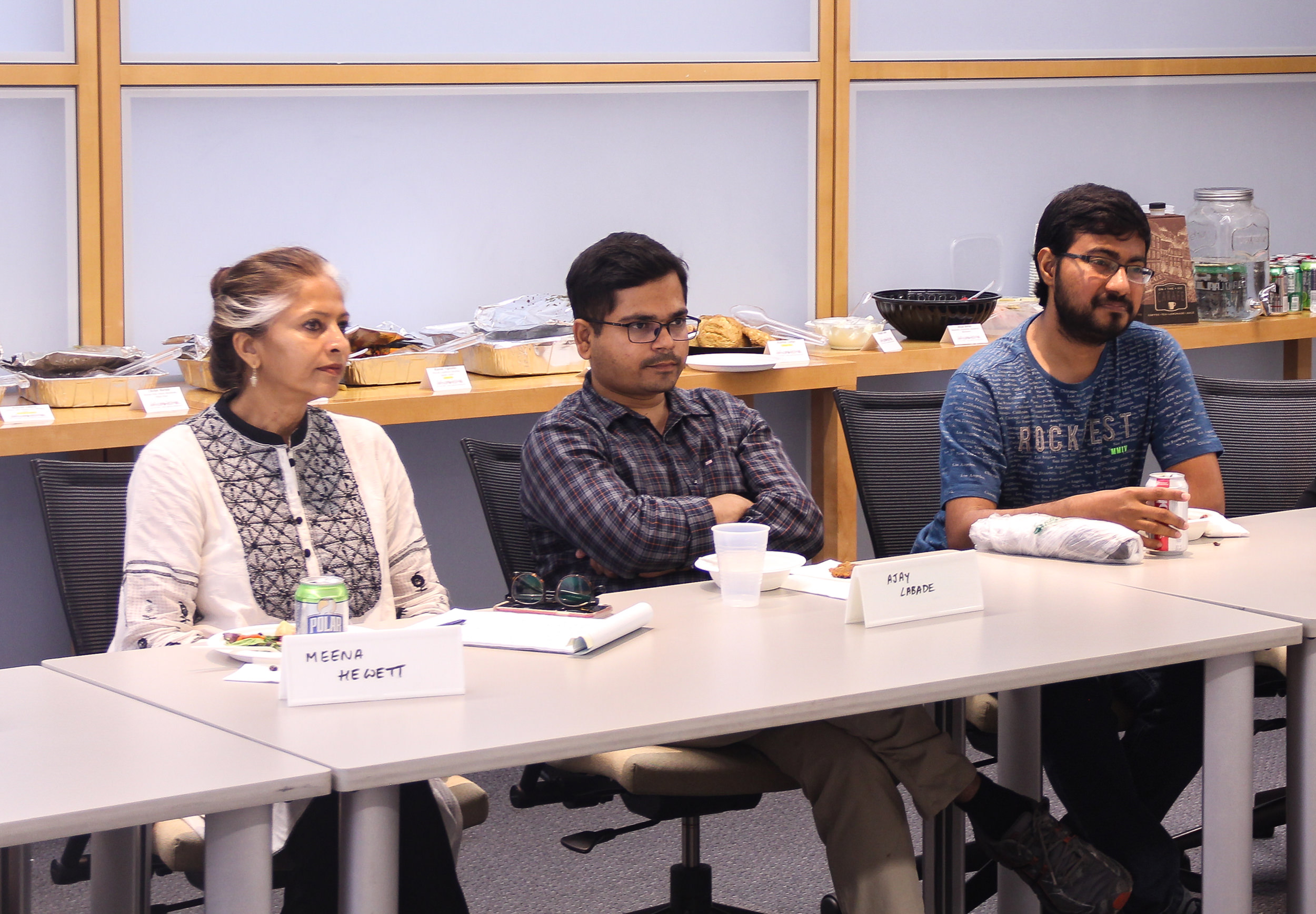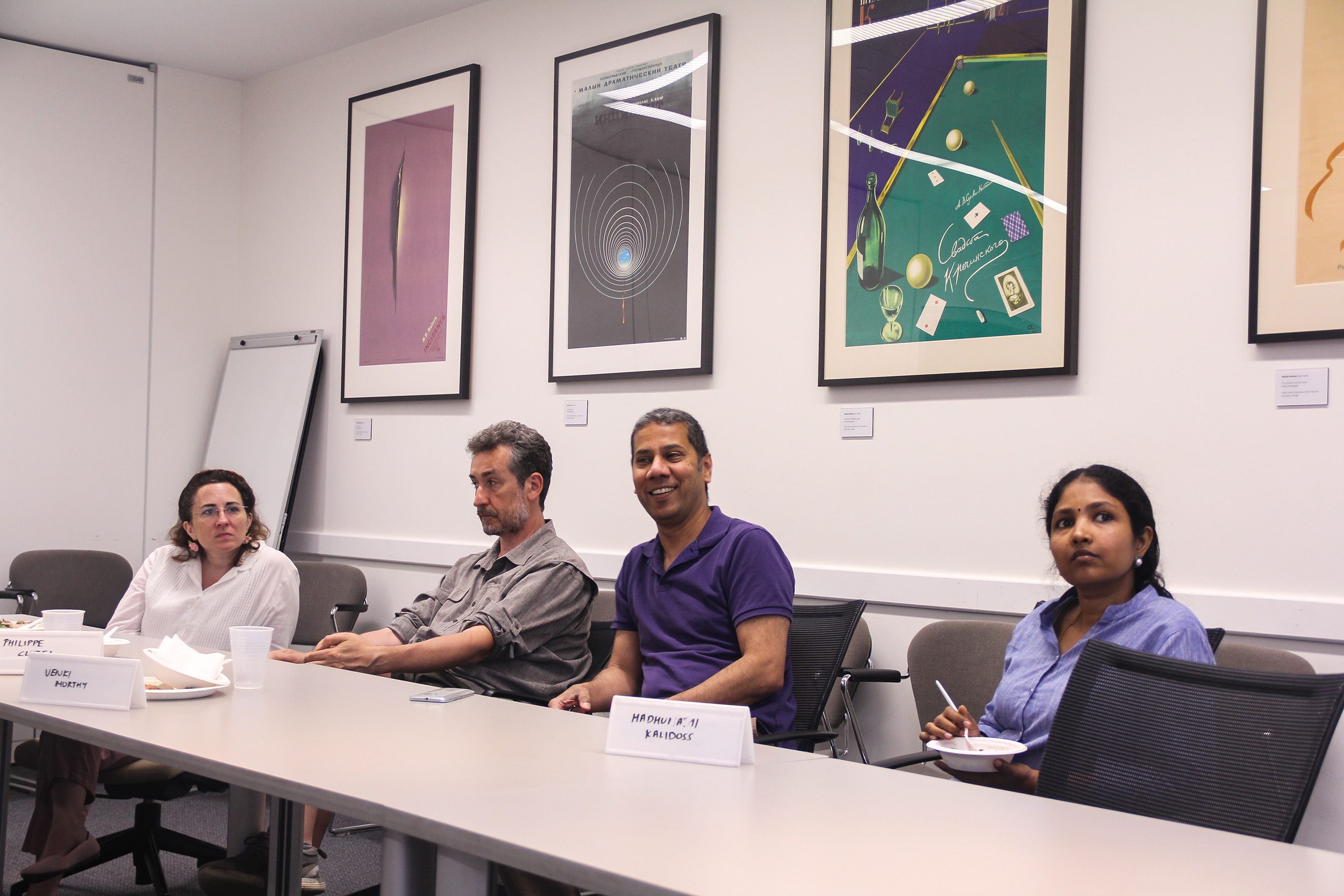
Meena Hewett (left), Executive Director of the Mittal Institute, with two of the new B4 fellows, Ajay Labade (middle) and Sudipta Tung (right).
The Building Bharat-Boston Biosciences (B4) Program, run by the Mittal Institute and funded by the Department of Biotechnology within the Government of India, aims to connect the scientific institutions of India and Boston to collaborate, share research, and build new knowledge in the field of biosciences. As part of the program, the Mittal Institute brings five scientific fellows from India to Cambridge to work in labs with faculty mentors across Harvard University and other local institutions. This week, our five visiting B4 fellows and some of their mentors came together over a lunch hosted by the Mittal Institute with Professor Venkatesh Murthy, faculty lead of the B4 program and Professor of Molecular and Cellular Biology at Harvard, to kick off the B4 fellowship.
“The B4 Program started as an exchange program running two-week workshops in India. Now, there are three parts: The workshops that we now do twice a year — teaching topics to students in the life sciences through lectures, demos, and hands-on learning opportunities,” said Professor Murthy. “Another very important component is how we have fresh PhDs from India come here as post-doctoral fellows for a year and a half. The final part is composed of the in-country seminars that provide science and society panels in India, with the idea to bring experts in — say on CRISPR or gene editing — and perform lectures in open-to-the-public events.”
Read about our five new B4 Fellows below to learn more about the research they’re working on during their fellowships.
Kritika Gupta
Kritika Gupta comes to Cambridge from the Indian Institute of Science (IISc) in Bangalore, where she specializes in Molecular Genetics and Protein Biophysics. At Harvard, her mentorship is under Philippe Cluzel, Professor of Molecular and Cellular Biology and Gordon McKay Professor of Applied Physics. “My lab mainly focuses on single-cell microbiology, seeing how cells are expressed in genes one at a time,” says Professor Cluzel. Through her research project, Gupta is performing comprehensive analyses of extensive datasets for mutational sensitivities at the Cluzel Lab.
“I’m looking at single bacteria cells and researching from the biological perspective,” Gupta says. “During my fellowship, I hope to apply my past knowledge and gain fruitful exposure to the world of science. In this respect, Boston has a vast academic culture that will allow sharing of scientific experiences and will strengthen my research capabilities through exposure to challenging tasks.” Commenting on the importance of mentorship, Professor Cluzel noted, “the post docs come here for training they may not have had during their own PhD studies. They can then use these skills somewhere else, and go back to India to continue this research and start their careers.”
Premananda Karidas
Premananda Karidas joins us at Harvard from the Indian Institute of Science (IISc) in Bangalore, where he uses his specialty in Plant Developmental Biology to research the development of biological surfaces — like plant leaves and insect wings — at the organ, cellular, and molecular levels. Karidas has been paired with mentor Elena Kramer, Professor and Chair of the Department of Organismic and Evolutionary Biology at Harvard and head of the Kramer Lab. “I am excited to learn, discuss, and define novel research questions — and answer them — at a pioneer lab that studies Aquilegia, an upcoming model organism for evolutionary and development biology studies,” Karidas says.

From left to right: Professor Elena Kramer, Professor Philippe Cluzel, Professor Venkatesh Murthy, and new B4 fellow Madhumathi Kalidoss.
Ajay Shankar Labade
Ajay Shankar Labade, coming to Cambridge from the Indian Institute of Science Education and Research (IISER) in Pune, specializes in the field of Genome Biology. While he is at Harvard, he will be working with his mentor, Professor Jason Buenorostro, Assistant Professor at Harvard University in Stem Cell and Regenerative Biology and head of the Buenorostro Lab. Labade’s research focuses on the functional importance of Nucleoporin Nup93 — a protein coding gene associated with diseases like nephrotic syndrome, which damages the kidneys.
Madhumathi Kalidoss
Madhumathi Kalidoss works with the Indian Institute of Technology (IIT) in Madras, and comes to Boston specializing in Biomaterials. Currently, her research is focused on developing local drug delivery systems for the treatment of periodontal infections using calcium phosphate bio-ceramic nanoparticles, using her dental background. Kalidoss’s mentorship falls under the guidance of Muhammad Zaman, Professor of Biomedical Engineering and head of Zaman Lab at Boston University. With Professor Zaman, she will work in the laboratory to use 3D cancer models and test dental biomaterials.
Sudipta Tung
Sudipta Tung hails from the Indian Institute of Science Education and Research (IISER) in Pune, where he specializes in Experimental Evolution and Population Dynamics. His research focuses on the different control methods for stabilizing extinction-prone populations. Tung’s mentor, Michael Desai, is a Professor in the Department of Organismic and Evolutionary Biology (OEB) and head of the Desai Lab. “I look forward to experiencing the vibrant intellectual atmosphere of Harvard University, learning new research techniques to expand my academic portfolio, presenting my work, and finding new opportunities for collaborative, interdisciplinary research projects on the global platform,” Tung says.
Exchanging Research
“We’re on a symbiotic, equal footing now in India,” Professor Murthy says about the B4 program. “It’s not us going there and telling people in India what to do — it has striven very hard to be equal. That’s why this fellowship program is very important.” The movement of post-doctoral scientists between India and Cambridge ensures a regular exchange of scientific research, and these postdocs return home with the knowledge and skills that can inform their future career paths and research.
The new B4 Fellows will be in Cambridge for the next year and a half to work with their mentors and build on the training they received during their PhD programs. Stay tuned to read interviews and view videos that will cover their work in the coming months.
